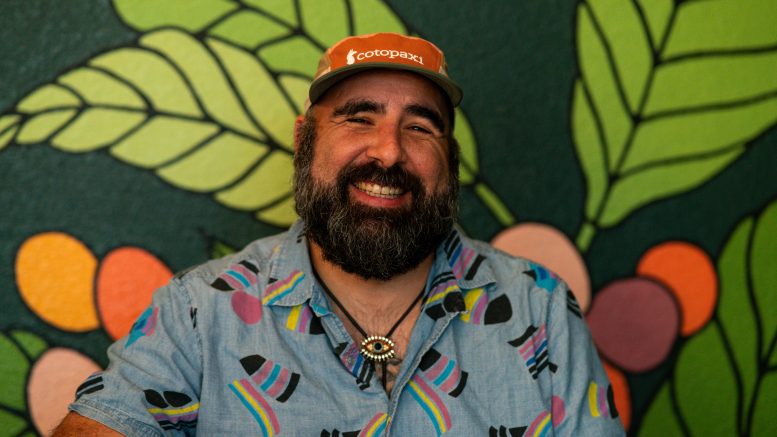By Cristian Gonzalez
NineFingers, the enigmatic musician with a penchant for blending styles, first picked up a guitar at 12 years old. Like many young artists, he found music through heartbreak, using his mother’s guitar to channel emotions he didn’t know how to express yet. But for Nine, this proved to be more than a phase. Music became a bridge that connected him to others in ways words couldn’t.
“I was on the autism spectrum without realizing it, and so I felt very separate from other people,” he explains.
Yet, once he started writing and playing songs, his music allowed others to see him for the first time. That early experience fueled a passion that would carry him through the next three decades — with a brief hiatus where dodgeball became his primary focus.
While music has been a constant, the styles and forms Nine embraces are anything but fixed. He describes his creative approach as “eating dessert first,” meaning he follows whatever excites him in the moment.
“I just don’t limit myself by worrying about whether I’m good at something or not,” he says. “If I want to do it, I just do it, and I’m willing to be bad.”
This philosophy has allowed him to dabble in everything from folk, punk and hip hop, with no particular loyalty to a specific genre. For Nine, music is about expression, not definition.
“Because what will happen is different people will be like ‘Oh, you remind me of this person.’ And they just want to hear more of whatever it is they happen to like … there would always be like three different people saying three different song styles and each one trying to pull me in opposite directions,” Nine says. “And so I was like, ‘I just need to do whatever I want to do.’”
That fearless exploration can sometimes take a toll. His music is deeply autobiographical, and in his 2019 album “Loop,” Nine confronted some of his darkest moments — PTSD, depression, alcoholism and losing his wife to addiction. Songs like “Lilith” and “PTSD Ferryman” forced him to dive into personal traumas, a process that was both dangerous and therapeutic.
“That was honestly dangerous for me to express because I had to really dive into my own traumas and triggers,” he says.
Though terrifying, this intense process ultimately helped him heal. Nine refers to it as “speed-running” his PTSD, going through the depths of his trauma so quickly and so completely that he emerged from it with a newfound sense of freedom. “I haven’t had a panic attack in seven or eight years,” he says. For him, music was the lifeline that kept him going, and in many ways, saved his life.
But the impact of Nine’s philosophy isn’t limited to his own healing. Since moving to Sacramento nearly four years ago, he’s found joy in fostering a sense of community through open mics and collaborative projects. Though he’s worked with musicians in different cities, Sacramento stands out for its camaraderie. “This is probably the most supportive group of artists … being kind to each other and wanting each other to succeed,” he says.
However, he also admits to the challenges Sacramento faces, particularly the lack of venues that cater to indie musicians. “The city is failing its artists,” he says, noting how quickly vital spaces can be shut down by a single noise complaint.
Despite this, Nine is committed to nurturing the local scene. His open mics are a space for musicians to explore and express themselves, regardless of their level of experience. And he helps organize a monthly songwriters’ circle where musicians can show their work to each other and seek feedback. “I don’t care how polished the performance is,” he explains. “It’s about nurturing artists to feel supported in a way that they continue to create art or start creating art.”
This story was funded by the City of Sacramento’s Arts and Creative Economy Journalism Grant to Solving Sacramento. Following our journalism code of ethics and protocols, the city had no editorial influence over this story and no city official reviewed this story before it was published. Our partners include California Groundbreakers, Capital Public Radio, Outword, Russian America Media, Sacramento Business Journal, Sacramento News & Review, Sacramento Observer and Univision 19. Sign up for our “Sac Art Pulse” newsletter here.



Be the first to comment on "Sacramento’s NineFingers finds healing and community through music and dodgeball"